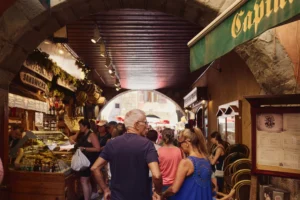Homestay, hotel, or apartment — which option is right for you?
When you prepare your French Escapade, one big question always comes up: “Where will I stay?”
The truth is, there is no single right answer. The best choice depends on your personality, your rhythm, and what you want to experience. Do you prefer immersion, comfort, or independence? Let’s look at the options together.
1. Staying with a French Host Family
If you choose to live with a host family, you’ll step right into French daily life. Meals become moments to practice, exchange stories, and taste traditional dishes. You’ll hear everyday French and join conversations that make your learning feel natural.
Of course, you’ll also need to adapt: respect the family’s rhythm, follow house rules, and share your space. If you’re open and curious, it can be the most rewarding choice.
“Sharing meals with my host family was the best way to practice French. Every dinner was like a free lesson — but with wine and laughter.”
— Helen, 64, UK
👉 If you’d like to combine language learning with real cultural immersion, see our French courses for seniors.
2. Staying in a Hotel
If privacy and comfort matter most to you, a hotel may be the perfect fit. You will have your own room to relax in after class, with services like cleaning or breakfast that make life easy.
The limit? You won’t naturally meet locals inside the hotel. You’ll need to join activities or explore the city to connect with French culture outside your room.
3. Renting an Apartment
If independence is what you’re looking for, renting an apartment could be ideal. You’ll shop at local markets, cook your own meals, and live at your own pace. It’s the best way to feel like a local.
But independence also comes with responsibilities. You’ll manage shopping, cooking, and cleaning — and you’ll need to be proactive about joining activities, otherwise it can feel a bit isolating.
“I loved renting a small flat. Doing my shopping at the local market and chatting with the baker gave me a sense of belonging.”
— Klaus, 60, Germany
At a glance: your 3 options
| Option | Advantages | Limits |
|---|---|---|
| Host family | Immersion, daily French, warm atmosphere | Less privacy, adapt to family rhythm |
| Hotel | Comfort, services, privacy | Less immersion, often more expensive |
| Apartment rental | Independence, “live like a local”, flexibility | More logistics, can feel isolating |
There isn’t a universal “best” choice only the one that fits you.
- If you value human contact and immersion, a host family is probably right.
- If you want comfort and your own space, you’ll feel at ease in a hotel.
- If you enjoy independence and flexibility, an apartment may be perfect.
Whichever you choose, remember: your accommodation is just the frame. The real picture will be painted by your French Escapade — the experiences you live, the friendships you create, and the discoveries you’ll bring back home.
👉 Read more real experiences in our article: French immersion for seniors: real stories and best cities.
👉 Need some handy expressions before your trip? Try our common French phrases with audio.
Frequently Asked Questions
What’s the most comfortable option for seniors?
Many seniors feel most comfortable in a hotel thanks to daily services and privacy. But if you’re eager to practice French every day, a host family may be the richer experience.
Is staying with a host family safe?
Yes. Families are carefully selected, and you’ll always have your own room. For extra peace of mind, you can ask in advance about house rules, schedules, and whether you’ll have a private bathroom.
Which option is better for long stays?
Apartments are usually the most practical for longer stays, giving you more space and flexibility. Host families are excellent for shorter or medium programs where daily practice is a priority.
Do homestays include meals?
Most homestays include breakfast and dinner, with lunch left free. Meals are often a highlight a chance to practice French naturally at the table.
I want to meet people my age. Which option is best?
A host family gives daily contact, while hotels and apartments require you to join activities to socialize. Many of our senior French courses include excursions and group activities where you’ll meet other learners.




